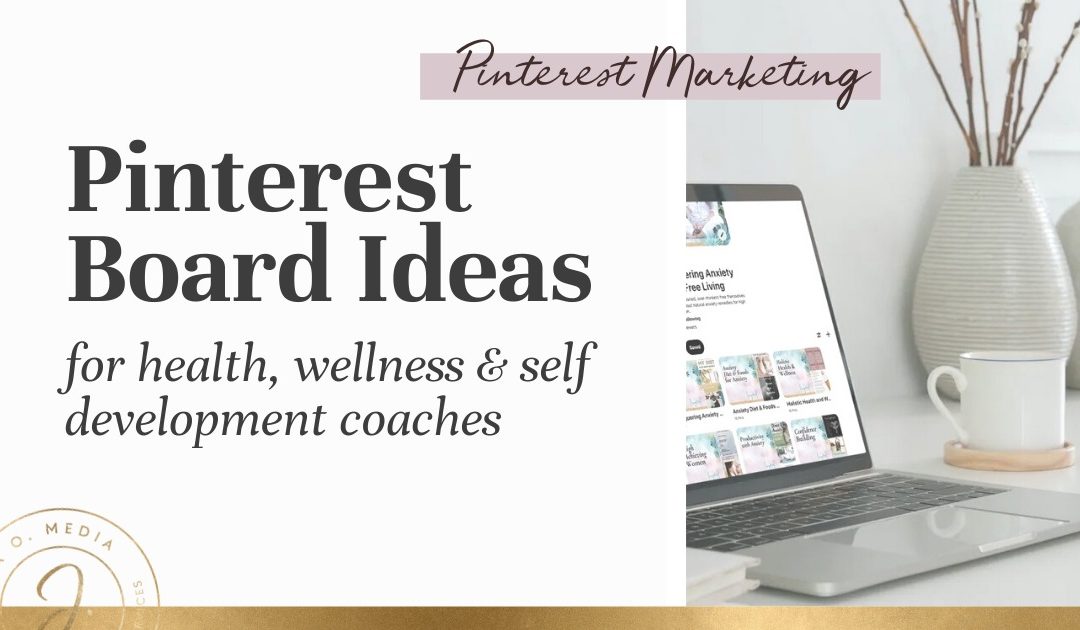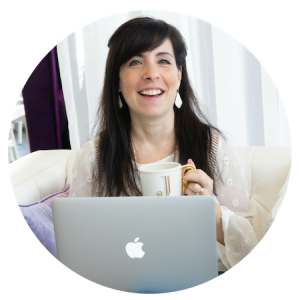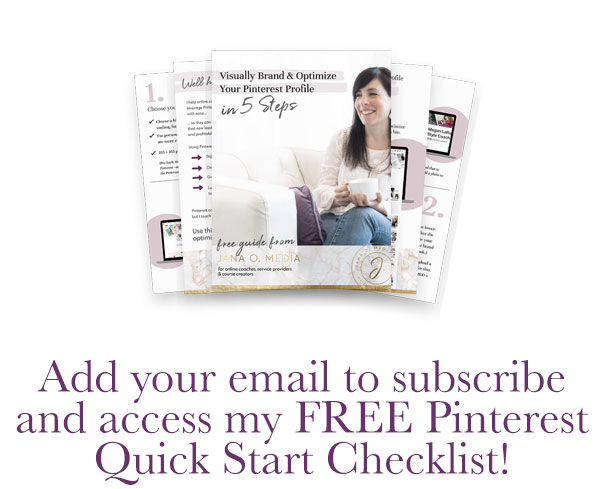“What Pinterest boards should I have?” ←– This is one of the most common Pinterest marketing questions I get from online coaches in the wellness and self development niches.
Choosing the right board topics and names requires a blend of strategy and creativity.
Strategy because you want your boards to:
- Attract ideal clients;
- Align with the content you create; and
- Showcase your areas of expertise as a coach
Creativity because you want your boards to:
- Be fun and interesting for your ideal client to browse;
- Represent your brand well
In this blog post, I’m going to help you get those creative juices flowing… while also guiding you to create Pinterest boards that will actually get you paid!
I’ll cover: (…click on any of these to jump to that section)
- Four Pinterest boards you definitely want to have (as a health and wellness coach)
- Three extra types of boards you can also mix in!
- Two types of boards I suggest that you leave out; 😲
- How to choose what boards to have on *your* profile; and
- Health, wellness, and self development board topics and keywords that are popular and trending!
Ready for a rousing Pinterest board idea – fest?
Brilliant! Let’s get this party started…
4 Types of Pinterest Boards You Want – for Sure!
Let’s start with the “must-haves.”
When you’re considering what boards to create, the number one thing I want you to keep in mind is this: You want to have Pinterest boards that line up with your “content pillars.”
This is really just a fancy way to say Create boards about what your coaching offers and your content help with.
And, while that may sound sort of obvious… I’m here to tell you it isn’t. 🤣 (Or at least it wasn’t initially obvious to me!)
In fact, when I first started creating strategic Pinterest profiles for coaches in 2017, I distinctly remember setting up a slew of boards for a certain business coach who hired me (at my beta price, thank goodness!)… only to later realize that the boards were related to business – but didn’t really match up with her content.
So, when it came time to pin her “original content pins” (pin that pointed to her website – freebies, blog posts, podcast show notes, paid offers, etc)… I didn’t have enough relevant boards for her stuff – so I ended up sort of starting again – and creating a second set of boards that were a better match.
Lesson learned! (And now I teach it to my students. 😉)
So, here are the four board types I suggest you definitely include. (Details on all below!)
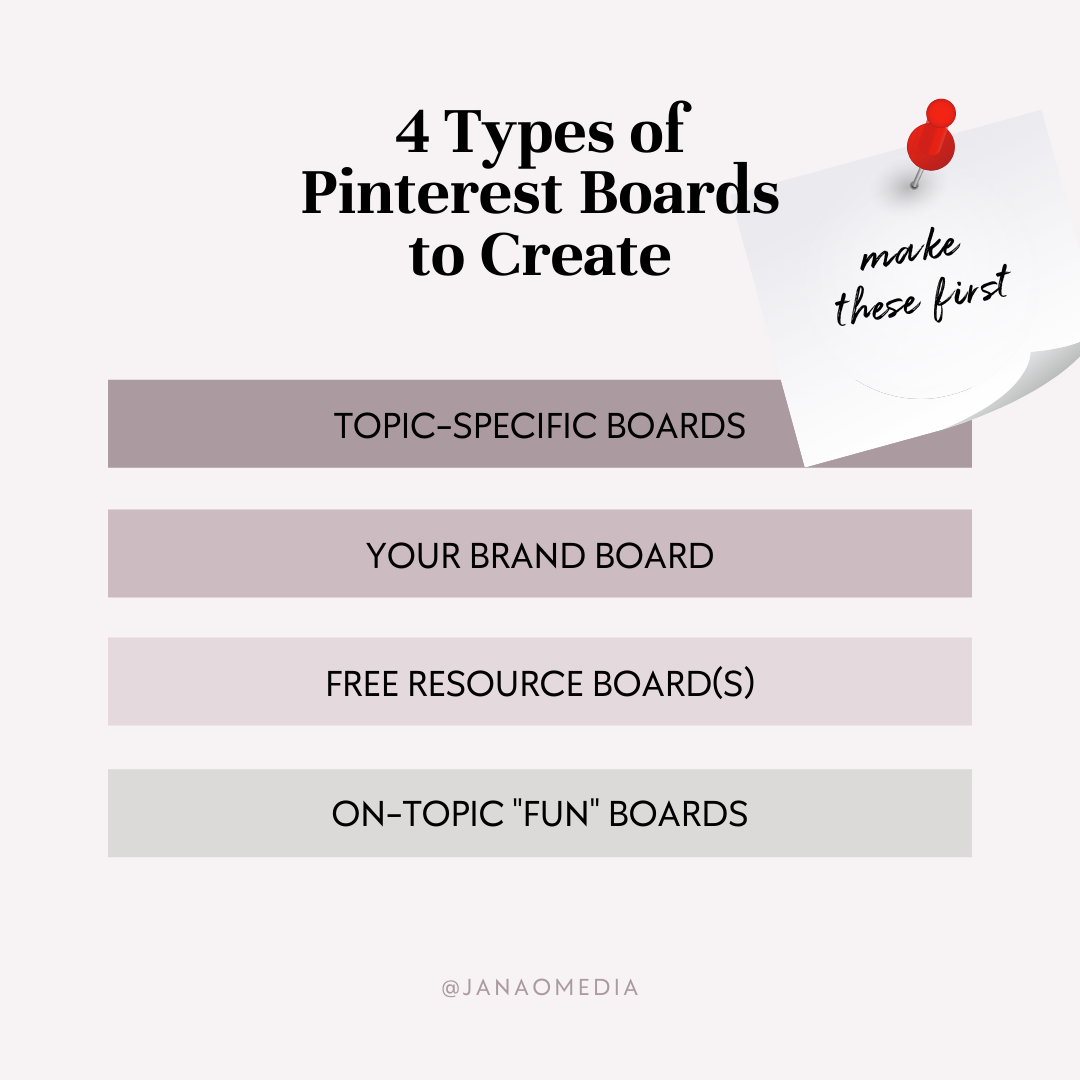
1. Topic-Specific Pinterest Boards
These will be the “work horses” of your Pinterest account… the bread and butter boards 😀 that will correspond directly to the content you create – and the topics you help with through your offers. They are the most important boards you’ll have. (The ones that will attract clients who pay the bills!)
I recommend that you start a new account with about 10 to 12 of these – and add more from time to time. (This blog post details on how many boards I recommend – and at what stages of your account.)
To come up with what they should be, jot down some notes and potential keywords to answer these questions:
- What are your value posts, blogs, podcast eps, freebies, or videos about?
- What questions do your people ask you all the time?
- What problems are you solving – with your free and paid offers?
- What solutions are your ideal clients looking for?
- What topics are trending in your niche?
Then (and this is so critical, that I’m going to say it twice!)… Conduct some thorough keyword research around these topics you listed. I’ll cover this again in the section below called “How to choose board topics,” but for now keep this in mind:
To get discovered on Pinterest by your ideal coaching clients, it’s imperative that you are using keywords on your account (including your boards!) that are common search terms. If you don’t, none of this will work, because fewer people will see your pins in their searches. Womp-womp.
(If you would like some 1:1 help with doing your keyword research, and setting up the right topic-specific board for YOUR service-based business… you may want to consider booking a “Profitable Pinterest Boards Intensive” session with me!)
2. Your Pinterest Brand Board
Your “brand board” should be positioned toward the top of your profile. You can add one copy of each of your original content pin designs (Remember: These are pins that point to your content; as opposed to other people’s pins you’ve curated).
It’s a board where all *your content* is pinned! It essentially represents your body of work to any profile visitors – and its the perfect place for them to browse your content and choose something they’d love to learn about – from you!
When Pinterest made updates to the profile layout in Fall of 2020, some Pinterest marketing experts started stating that “brand boards” were no longer needed, because the “Created” tab now highlights all of your recent pins.
I disagree. I still like to create a brand board for one main reason:
More and more, pinners are visiting your profile.* So, having a board front-and-center with your name or brand name, and a board cover image with your photo? It reinforces your brand. I think it enhances the intentional look of your profile – which underscores that you’re an expert (not just someone who randomly pins about the topics at hand).
(*We used to think that profile visits were rare – that people would find your pins in their searches, but rarely click to your profile. With new features and the aforementioned profile layout updates, this has changed.)
Important Note: The trend of calling this board the “Best of” board is over. Instead, be sure your brand board title includes some of your highest profile keywords. So, for example, I call mine: “Jana O.’s Pinterest Marketing Tips” – not just “Best of Jana O. Media” or “Jana’s Blog” (or something else without keywords).
More examples of brand boards (with keywords):
- “Healthy Weight Loss with Jen Ross”
- “Krystal Chong | Conquering Anxiety Naturally”
- “Help for Lyme & Chronic Illness – Lisa’s Tips”
- “Leah’s Self Care & Work Life Balance Tips”
- “My Life After Divorce Blog”
Pro Tip: Your brand board’s name can be very similar to your profile name! You can learn more about choosing a profile name that will attract clients in this blog post.
3. Free Resource Boards
The third type of board you’ll definitely want to mix in – when you’re ready for it! – is a free resource board. (You’re ready for it when you are at the point where you’re promoting a lead magnet on Pinterest – to grow your email list.)
This is another ideal way to capitalize on the fact that more and more, when something you pin catches their eye, people are visiting your Pinterest profile.
And, these boards can also help your freebies get found in people’s searches – when they search for your topics! (So when you do your keyword research, spend a little time finding out what “free stuff” people are looking for – around your topics of expertise.)
The idea here is that you’ll pin your lead magnets to this board. You can also choose to mix in other people’s on-topic free resources – or not. Your choice.
I like to position this board in the top row on your profile, too… possibly next to your brand board, or somewhere along the top. This way, when someone visits you, she’ll see a board full of pins that clearly offer a no-brainer “next step” to learn from you (and to join your list, so you can keep in touch and nurture her as a lead).
As with your brand board, be sure to include some keywords. So, don’t call it “Free Resources from Debbie.” Instead, call it “Free Gluten-Free Meal Planning Tools.”
More examples of free resource boards:
- “Free Self Care Printables from Maria”
- “Free Morning Routine Checklist for Moms”
- “Free Guided Meditations”
- “Free Life with Chronic Illness Resources”
- “Free Journal Prompts for Building Confidence”
- “Free Guide to Getting Better Sleep”
- “Free Pinterest Checklists for Online Coaches” (Had to squeeze mine in! 😉 )
4. Fun Boards (aka “Curation” Boards)
Lastly, you’ll probably want to round out your profile with two to three “just for fun” boards. These will be mostly for curating others’ pins – so don’t worry too too much about whether you’ll have a lot of your own content to pin here.
(And note, that because unlike the “bread and butter” topic-specific boards, these won’t necessarily house a lot of your own pins – you only want a few of these. The topic-specific boards need to be your priority. Otherwise you’ll end up in that spot I described above in which I didn’t have enough relevant boards for my client’s content. AWK-ward! 🤣)
So, I’ll allow you two or three “just for fun boards.”
BUT, this is not permission to go off the rails. 😉You still want to keep these on-topic and very closely related to your niche. Don’t go too general.
For example, my client Andi is an online dating coach. When I asked her what types of interests her clients generally have, she told me they enjoy fashion and beauty. They value looking good. But we didn’t create a board called, “Fashion” or “Style.” That would be waaaaayyyyyy too general. Instead, we created a board called “Date Night Outfits.” It’s totally on topic, and gives Andi a place to pin fun (and sexy but classy!) outfits.
Another example: Let’s say you’re a home schooling coach, and you know your ideal clients are interested in family nutrition, but you don’t teach about it yourself. You could add a “just for fun” board called “Healthy Afternoon Snacks for Kids.” (“Healthy Meals” would be too general.)
More “just for fun” board ideas*:
- “Self Care & Home Spa Ideas” (when you coach people around anxiety management, for example)
- “Meditation Room Ideas” (when you teach people how to meditate, for example)
- “Fashion Tips When You’re Losing Weight” (if you’re a weight loss coach, for example)
- “Date Night Ideas for Married Couples” (when you teach people how to release past trauma and thrive in their current healthy marriages, for example)
- “Creative Kids Bedroom Ideas” (when you’re a positive parenting coach)
*These are just ideas to get your creative juices flowing…. Keep in mind that one coach’s “just for fun” boards may be another coach’s “topic-specific boards.” …Because each coach’s specific content and audience is unique to her – even when the niche is similar.
3 Extra Pinterest Boards Ideas
Okay, now you have your basic boards sorted. You have some topic-specific boards, and your brand board. And perhaps you added a free resource board and a couple of “fun” boards.
(Go, You! You’re amazing!)
What else can you do with boards?
Here are four more Pinterest board ideas that are totally optional, but can be useful – depending on your specific content marketing strategy.

1. Your Media Appearances & Placements.
If part of your content strategy includes media appearances, you could create a board on which to feature them. This could be the board to pin:
- Guest blogs
- Media articles you write
- Podcast episodes you appear on, etc.
Having this board certainly helps position you as credible and expert – especially when someone lands on your profile to check you out.
And, this can also be a selling point when you’re pitching for guest appearances. You can let the influencer or content creator know that – in addition to promoting the piece on social, in email, et. – you’ll be pinning it to Pinterest, too.
2. An Instagram Board (Yes! On Pinterest!)
As of a couple of years ago, you can now claim your Instagram account on Pinterest. (Do this under Settings >> Claim. You’ll need to be logged in to both platforms to do this, but it’s super-easy.)
So, you can take advantage of this connection and pin some of your Instagram posts to Pinterest – with the goal of cross-promoting the platforms and getting more eyes on the content you’ve worked hard to create.
You can do this in a few different ways:
- You can simply use the same graphic you used on Instagram, and pin it using the Instagram post URL. (Keep in mind that different things work well on different platforms, though.)
- You can re-size your Instagram images (Canva for Work has a very convenient re-sizing tool!) – and use those as pins.
- You can create totally new vertical graphics that are more Pinterest-optimized – and pin those.
- An advanced strategy: You can re-use your Instagram reels as idea pins and / or video pins on Pinterest! If it’s a video pin, point the pin to a related piece of content.
Last thing: (You guessed it!)… Use Pinterest-specific keywords on this board, too – to help the algorithm know who to show it too. For example, “Kara’s Keto Tips on IG” would be better than just “Kara on Insta.” 😉
3. Your Podcast Board or Youtube Board
There are two tactics you could take here.
Tactic 1: If you create a podcast or Youtube videos as a main form of long-form content, you can consider creating a “secondary brand board” of sorts.
Similar to your brand board, in this case you’d pin only your original content here. (This would be in addition to your brand board.) This can serve as:
- an additional, highly-relevant board on which to pin your own content; and
- a board that highlights your content and expertise – so that when a pinner visits your profile, she can easily browse – and even binge!
Again, remember to include keywords. Don’t simply call the board “Wendy’s Podcast” or even just the name of your show – unless your show name includes keywords you’ve validated on Pinterest.
A great example of this type of board is on my client Melissa’s account. She’s the brilliant hormone health and digestion expert (and Youtube Creator) behind Sexy Food Therapy. She has a second brand board called “Hormone Health Videos” – where we pin all her insanely valuable Youtube videos.
Tactic 2: Alternatively you could create a “topic-specific” style board that houses BOTH your podcast episodes or Youtube videos – AND other people’s related podcast episodes and Youtube videos, too – in addition to yours.
Note: This works best when the topic you teach about – paired with the word “Podcasts” or “Videos” (or something like that) is commonly searched on Pinterest.
For example, some quick keyword research using my method (the one I teach in my e-course Pinterest with Purpose) tells me that the term “Podcasts for Anxiety” is commonly searched. So, a coach who helps women with anxiety could create a board called “Podcasts for Anxiety” – and pin both her own podcast episodes there, and episodes from other podcasters that have shows on this topic, too.
Next up… Two types of Pinterest boards I recommend that you do NOT have! 😲…
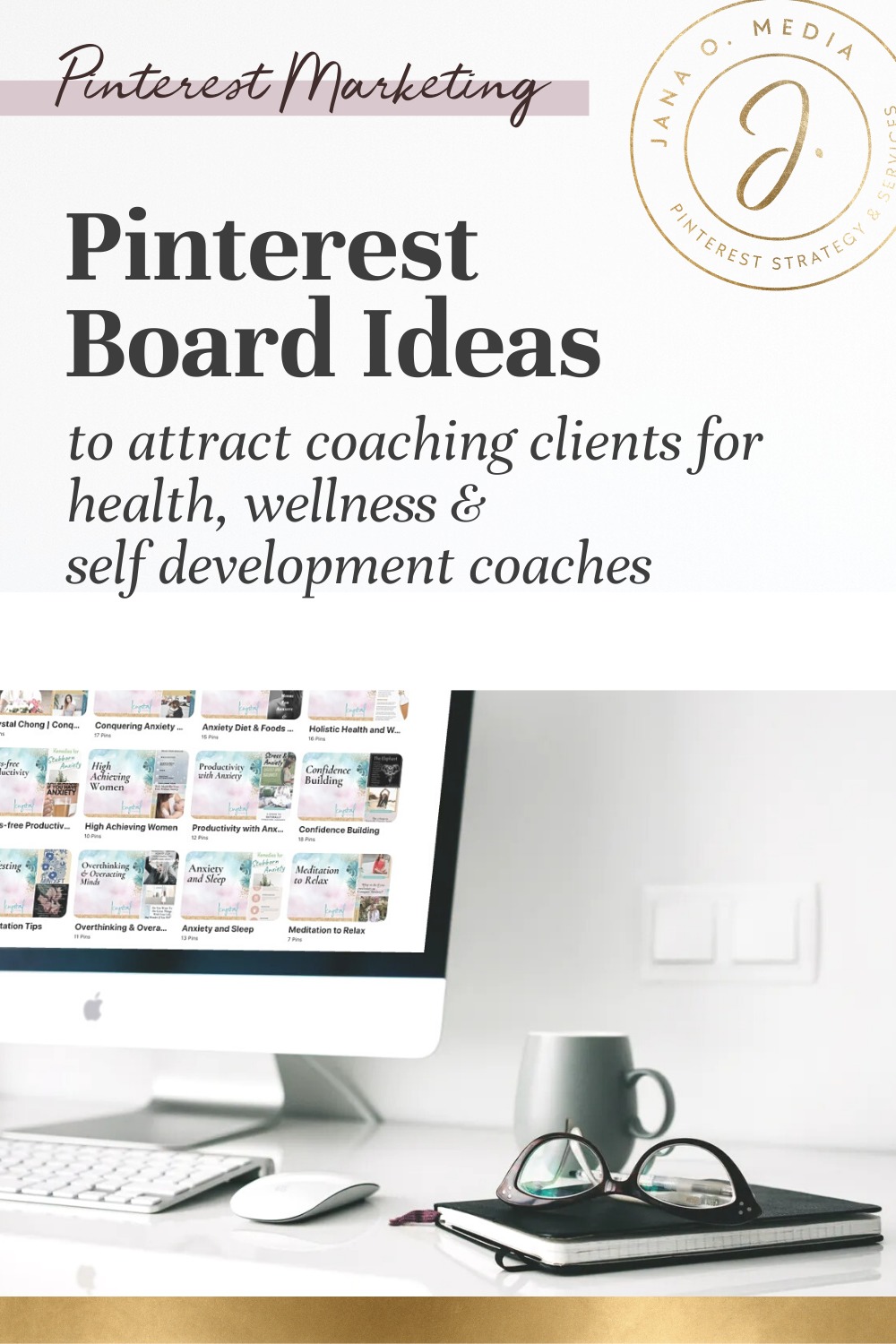
2 Types of Pinterest Boards to Leave Out
Now that you have some ahhhh-mazing Pinterest board ideas… and a good understanding of what boards I recommend that you have…
I want to take a quick second to mention two types of boards that I think you should skip. They are…
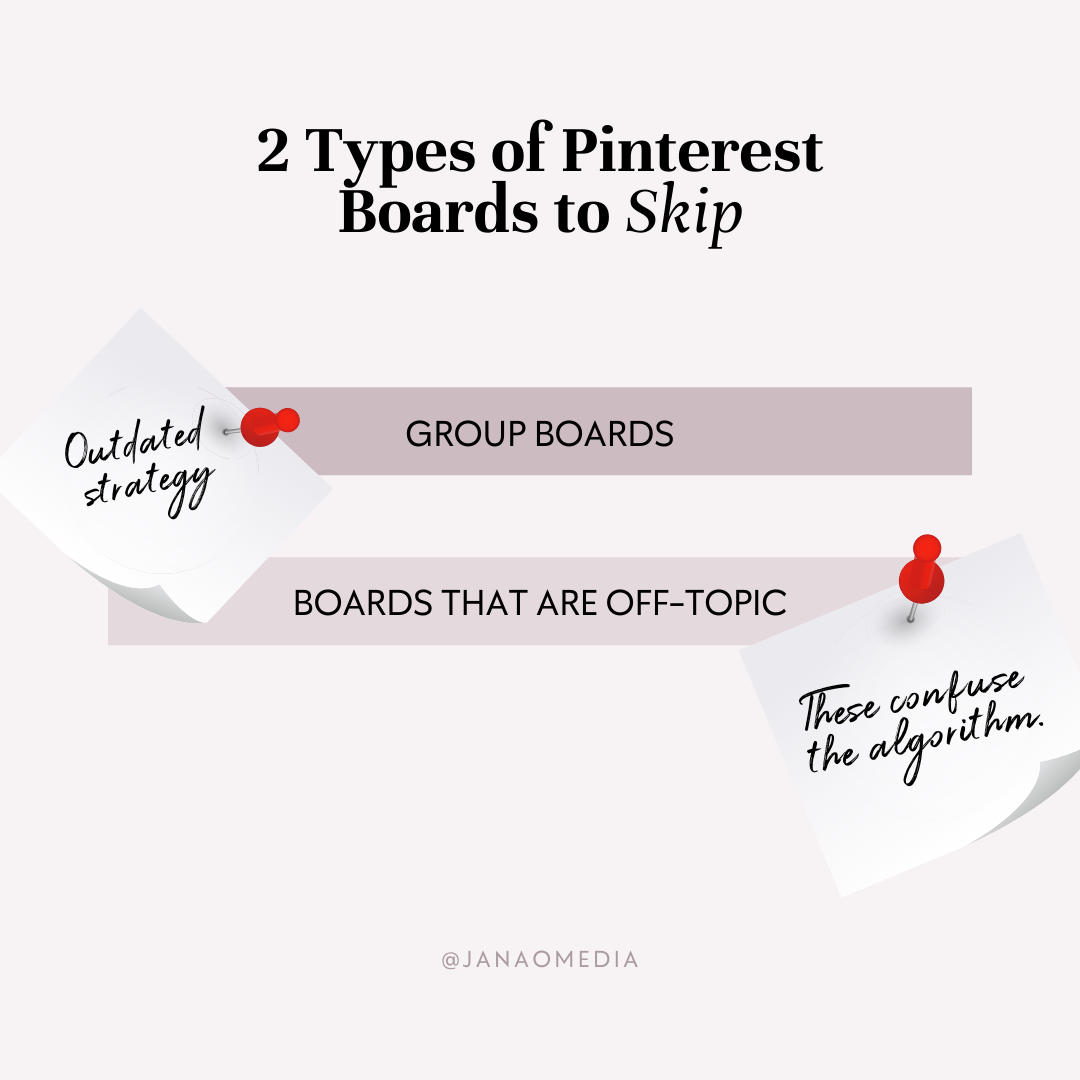
1. Group Boards.
Many moons ago (like in 2017), Pinterest group boards were a pretty effective strategy. Bloggers, e-comm sellers, service providers… Everyone was joining and contributing to group boards – with pretty good results.
But in 2018, Pinterest announced they were de-prioritizing them in the algorithm. And now group boards are really an outdated strategy.
(Unfortunately some people haven’t gotten the memo, and they are still trying to use them to hack traffic – or worse, they are teaching them to others as a tactic… But, trust me, unless you’re *already* part of small, niched group boards – and they are actually getting you saves and/or clicks – your time is better spent on other Pinterest tactics.
You can read a whoooole lot more about why I do not recommend or teach group boards in this blog post.
2. Boards that are not *directly* related to what you help with
And I mean *really directly.*
I already implied this in the “Fun Boards” section above, but it’s really key to keep your boards – and your account – really tight when it comes to your topics.
Steer clear of boards that are big, general, catch-all topics… Like “Healthy Recipes,” “Workouts,” “Mental Health,” etc.
Instead, get more clear and specific about what your account is about. Research your chosen topics. Then choose more specific sub-topics to be your board topics – like “Low Sugar Smoothies,” “At-Home Kettlebell Workouts,” or “Trauma Processing.” (See the next section for more on how to choose.)
On a related note, you also want to keep any personal and off-topic boards “secret” or “archived.”
I sometimes have a course student or a client ask me, “Could we just leave all my Italy trip planning boards, my gardening pins, and my bathroom renovation boards on there? I mean, they show my ideal client I’m a real person, right?”
And I get this thought process… But it’s a “holdover” (if you will) from a time when you were planning to use Pinterest like social media. But it’s not social media, so we don’t want to try to use it as such! It’s a search engine.
(If you’re new to Pinterest, and you haven’t made this crucial thought process shift yet [from thinking of Pinterest like social media… to thinking of it as a search engine] you can read this post for more details!)
We want to keep your pins and boards on-topic because they help Pinterest know what your content is about. They signal to Pinterest who they should show your pins to – and in what searches. Off-topic pins and boards confuse the Pinterest algorithm. This makes it harder to get in front of an action-taking audience – women who are likely to spend money to solve the problems you solve. ←—– And this defeats the purpose! Eek!
So, keep things tight!
What Pinterest Board Ideas Should You Use?
So… Remember that common question I get – from health, wellness, and self development coaches?
“What Pinterest boards should I have?”
Well as you may have already surmised from this blog post, when it comes to choosing from all your board topic ideas, here’s the thing:
There simply isn’t a “plug-and-play” list of boards that I can tell you to make.
You want to create a set of boards for your account that are highly-relevant to you and your niche. Your choices should be guided by:
- What you create content about
- Who exactly you help; and how you help them
- What they are actually searching for* – around what you teach and help with
*A system for Pinterest keyword research is the way to learn this – and to use the information to optimize your account so your ideal clients will find you. You can learn my system for research, keyword organization, and account optimization (and a LOT more!) in my course, Pinterest with Purpose.
All that being said… It is helpful (and inspiring!) to take a look at what is trending on Pinterest – and what is predicted to trend – around health and wellness topics… so let’s!
Some Health, Wellness & Self Development Trending Pinterest Keywords (2020 & 2021)
In the past few years, Pinterest has truly become a hub for health, wellness, and self-development information (and ideas and inspiration). But you knew that… That’s why you’re still reading this mega-blog! 😉
When you look at the trends, it’s easy to see why it’s so smart to be pinning your content to Pinterest – and attracting ideal clients who are searching for what you help with!
Let’s take a look at some of the searches that are popular.
First, though… An important preface to these:
It is quite possible that you won’t see “your exact things” here on these lists. In fact, the nature of the “be specific to your niche” approach to board topics is that I couldn’t possibly list all the popular health and wellness related topics and board ideas!
Understand that anytime you see topics trending, there are two things you can “do” with that information:
1. You could absolutely use those keywords in your pins and your content – if they are highly relevant to your content and niche.
But, more likely, you can… 2. See the trends as indicators of the increase in searches around that general topic – and related health and wellness topics.
Make sense? Okay, cool. Now let’s look at some of those trends…
At the end of March 2020, Pinterest published an insights article about “work from home” topics blowing up. (Not surprising! In March, it became apparent that Covid-19 was going to result in many of us working exclusively from home.)
This shift to quarantine life definitely impacted what were health and wellness-related topics on the minds of people around the world. Specifically, Pinterest saw these keywords trending (among many other related ones):
- “self care at home” (up 332%)
- “meditation tips for beginners” (up 108%)
- “10 minute stretch workout”
- “how to power nap”
- “5 minute yoga routine” (No specifics on the percentages were given for these last three)
Then, a September 2020 article from Pinterest reported: “Because this year, people on Pinterest are [putting] extra emphasis on going inside, both physically and mentally, to focus on the areas where they have the most control. It called out that these keywords were trending:
- “ASMR food” (+84%)
- “mindful eating” (+44%)
- “mental health activities for kids” (up 3.5x)
- “kids workout routine” (+88%)
- “art therapy activities” (+ 65%)
- “mental strength quotes” (up 2.5x)
- “mental health check in” (up 5x)
This December 2020 article about new platform features included this: “More time at home and less commuting means defining balance for the self, driving an increase in fitness and wellness boards with titles like…
- “workout videos” (up 6x)
- “gym workout for beginners” (7x), and
- “grounding exercises” (5x)
This February 2021 article highlighted that users are coming to Pinterest in search of ways to practice self-love and increase self-acceptance – and learn more about mindfulness. (They write that the 2020 pandemic triggered a “mental health movement.) They add that Pinterest searches increased for…
- “how to love myself” (6x)
- “grounding exercises” (5x)
- “mental health check in” (12x),
- “healthy mindset quotes” (5x), and
- “accepting yourself” (+40%)
- “mental health painting” (2x)
- “mental health journaling” (10x) <—– Wow!!!
My own research for clients on Pinterest in 2020 (using multiple Pinterest resources, including the Pinterest Trends tool) revealed lots of commonly searched keywords across many niches. Here are just a VERY small selection of them:
- increase metabolism for women
- weight loss plans
- weight loss meals
- weight loss motivation
- stop sugar cravings
- healthy eating at work
- how to debloat
- fat loss over 50
- antiinflammatory diet
- conquering anxiety naturally
- stress relief for high achieving women
- productivity with anxiety
- foods for anxiety
- self love goals
- confidence building
- your nervous system and trauma
- trauma processing
- healthy marriage tips
- hormone health for women
- hormone balancing diet
- adrenal health
- PMS relief
- gut health recipes
- PCOS diet
- loving kindness
- intuitive eating
- mindfulness activities
- setting boundaries in relationships
- self care for entrepreneurs
- entrepreneur health
- energy boosters for women
- time for yourself
- foods for energy
- healthy after 40
- healthy after 50
- body positivity
- menopause diet
Wow, right?
Still can’t get enough of all of these Pinterest board ideas (aka health and wellness topics that are commonly searched and on the rise!)…?
If you’d love to see even more keywords that trended in 2020 – and read more about what Pinterest is predicting to be popular in 2021, check out this new blog post. (It’s new at the time I’m writing this!)

